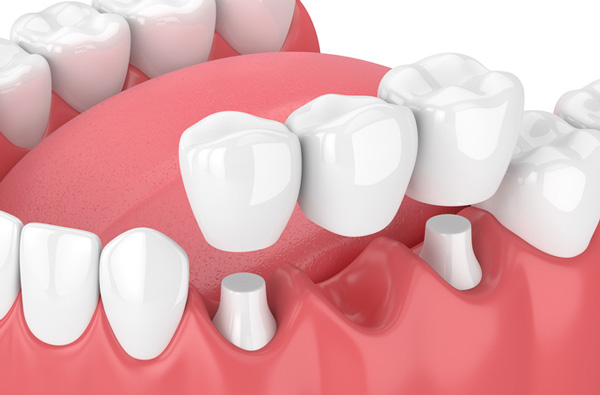Dental Bridge Dental bridges are natural-looking tooth replacements which help maintain facial structure, reduce stress on the jaw and fill in the gaps caused by missing teeth. Fixed bridges are cemented to the existing teeth and do not come out. Dental bridges are natural-looking tooth replacements which help maintain facial structure, reduce stress on the jaw and fill in the gaps caused by missing teeth. Fixed bridges are cemented to the existing teeth and do not come out. Traditional, cantilever, composite, Maryland, and implant-supported bridges are the five most common types of dental bridges used today. A common solution for replacing missing teeth is to use bridges. There are several kinds of bridges and solutions available to treat your individual oral ailment. To guarantee that your bridge lasts as long as possible, it is important to maintain good oral hygiene. At Cramer Dental we offer dental bridges and other restorations that will allow you to regain your bite function and improve your smile. Traditional BridgesThe most common form of dental bridge is a traditional bridge. You can use these if you have natural teeth or dental implants on each side of the gap left by a lost tooth. They are typically tiny and lightweight, and they give exceptional chewing pleasure by transferring your natural biting force, which has been hampered by your missing teeth. Traditional bridges need the removal of enough enamel from your remaining teeth to fit the crowns. Because enamel cannot regenerate, well-fitting crowns must constantly protect the abutment teeth. To last, your bridge must be well-maintained, vibrant, and stable. Cantilever BridgesCantilever bridges are utilized when only one anchor tooth can support the lost tooth or multiple teeth. This type of bridge is not suggested for use at the back of the mouth because it tends to put too much bite pressure on the abutment teeth. When the front tooth is the cantilevered tooth, it can function if properly constructed. A reputable lab can build dental bridges to account for biting pressures, making these bridges a useful option for saving costs. Maryland BridgesWinged bridges are recognized for being conservative. A metal frame supports the plastic teeth and gums. Metal attachments are fused to opposing teeth to secure them. In situations where the surrounding teeth are stable, special resin-bonded bridges are put on the front teeth. This dental bridge requires just minor adjustments to the shape of the abutment teeth. This approach is reasonably efficient and cost-effective when compared to standard fixed bridges. A careful bite examination is required to establish whether this Maryland bridge option is correct for you. Those with cross or deep bites are not advised. The abutment teeth get darker over time as the metal on Maryland bridges tarnishes. They also tend to debond. These sorts of dental bridges are frequently temporary. You can use them while your implant heals or if you're under the age of 18 and waiting for your growth cycle to conclude. Composite BridgesA composite bridge is a simple and inexpensive treatment for those who have one to two lost teeth. During a single dental appointment, a composite bonding material is inserted right into the vacant gap. Patience is required while reconstructing a lost tooth using composite material. Furthermore, the design's materials are prone to chipping or coming loose. Ribbond can be used as a reinforced ribbon or wire to strengthen composite bridges. Composites, like Maryland bridges, are temporary and can be utilized by persons with periodontal disease who want to postpone tooth extraction. Implant Supported BridgesDue to no harm being done to the neighboring natural teeth, implant-supported bridges have grown more popular over time. These dental bridges are entirely supported by implants; no bulky materials or crowns are required. This form of bridge, when properly integrated, allows you to clean in between and around dental implants and is quite sturdy. Combining too many implants might result in difficulties such as implant rejections and failures. Two implants supporting a bridge are more effective and easier than three. The implant-supported bridge should feel as comfortable and natural as your existing teeth. Your implants can last the rest of your life if you maintain good hygiene and oral health. The use of dental bridges remains a viable tooth replacement treatment. We can help you improve your bite with bridges at Cramer Dental. We can be reached at (484) 370-4010. |
|
|